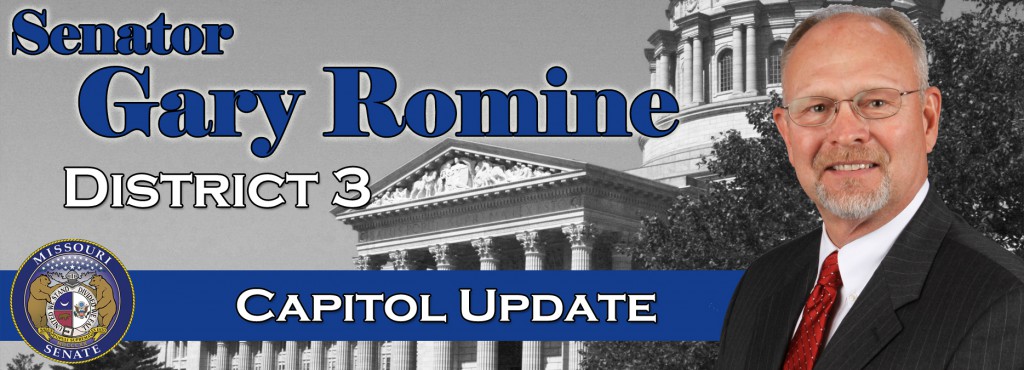 |
|
Feb. 29, 2018 Missouri Senate Takes Action on Important Reforms
We made a significant amount of progress in the Missouri Senate this week. I was especially excited to see two of my top priorities move forward in the legislative process and I believe we are on the right track to improving the policies that govern our state boards and commissions as well as our public education system. Legislative Process When a bill is filed in the Missouri Senate, it is first read, second read, perfected and third read on the floor. At the first reading, the bill is introduced on the Senate floor. It then has to sit for 24 hours, and it can be second read, which means it is referred to a committee. Up to the discretion of the committee chair, the bill may then be heard in a public hearing where expert testimony and public input can be provided. Once a public hearing has been completed, the committee may vote on the bill, either with or without amendments, in an executive session. If the bill passes out of the committee, it can then be put on the Senate perfection calendar. When the bill is brought up on the Senate floor for perfection, the full Senate debates and can amend it. If the majority of the Senate approves of the final version, the bill is declared perfected and can no longer be amended. Lastly, the bill goes through third reading where it is debated again and put to a final vote. If a simple majority of senators (18) votes yes, then the bill is passed and is sent to the House of Representatives where it undergoes the same legislative process. If the bill is changed in the second chamber, the bill will need to finish in a conference committee made up of both House and Senate members. Once language is finally agreed to, the bill can be passed. Considerable and thoughtful compromise is often required to pass a final version of the bill. If passed by both chambers, the bill is sent to the governor for his signature or a veto. If the governor vetoes the bill, then the legislature can override the veto with a two-thirds majority vote. Legislative Updates I had the opportunity to move a very important policy forward in the Senate this week by offering my Senate Bill 794 as an amendment to Senate Bill 695. Senate Bill 794 has been a major priority for me during this legislative session, so I was excited to add this reform onto an already important policy change in SB 695. My amendment requires the governor to notify the Missouri Senate, in writing, of any appointments made when the Senate is not in session. In addition, once the Senate has been notified, the governor is prohibited from withdrawing the appointment unless authorized by the Missouri Senate or in cases of misconduct by the appointees. If an appointee chooses to resign before being confirmed by the Senate, the governor will be required to notify the Senate of the resignation and request the nomination be sent back; however, if the Senate does not approve the request, the appointee will be prohibited from reappointment. Perhaps most importantly, appointees will not be able to vote in any meetings of a state board or commission until confirmed by the senate. At all meetings of a board or commission, five members who have received the consent of the senate are necessary to constitute a quorum for conducting business. If at any time a quorum is not possible, the state treasurer shall distribute necessary appropriations pursuant to state and federal law. My amendment to the bill was approved and SB 695 was perfected. On Thursday, it was third read and passed. It will now move to the House. Amending SB 695 with my language was an alternative and efficient way in which to move this important reform forward. This week, I also offered several amendments to legislation during floor debate. I filed Senate Bill 576 which was combined with Senate Bills 603 and 898 because all three bills deal with changes to the Missouri Virtual Instruction Program (MOVIP) to the Missouri Course Access and Virtual School Program. The bill allows any eligible student to enroll in an online course of their choice to be paid by the school district or charter school they currently attend. Students are required to be enrolled in the district at least one semester before enrolling in an online course. My first amendment included a provision that waives the enrollment requirement for students who have documented medical or psychological diagnoses or conditions that prevented them from attending a school in the community during the previous semester. My second amendment would require local school boards to provide enrollment decisions within 30 calendar days of an appeal. After two more amendments were offered by other senators, the senate substitute for the senate committee substitute for SBs 603, 756 and 898 was declared perfected. These policy reforms will now need a final vote in the Senate. If passed, they will move to the House of Representatives for approval. I am excited about these bills moving forward and I believe they have the potential to be signed into law. These reforms would be a positive step forward for Missouri. Capitol Visitors My staff and I welcomed Jeremy Kertz, Eric Meyer, Kinsley Fitzpatrick, Katlin Abt, Michael Haynes, Anthony Meyer, Lauren Bridgewater, Tom Hurt, Jeremy Gagnon, Christina Jackson, Ralph Ogden, Beth Ogden, Audrey Yates, Bill Stis, Ashley Merritt, Robert Andrews, Jennifer Granda, Jim Hamblin, John McCormick, Sandy Holifield, Makenzie Beckham and Ryan Humphres to the Capitol this week. I always appreciate hearing your comments, opinions and concerns. Please feel free to contact me in Jefferson City at (573) 751-4008. You may write me at Gary Romine, Missouri Senate, State Capitol, Jefferson City, MO 65101; or email me at gary.romine@senate.mo.gov; or www.senate.mo.gov/romine. |
Missouri Senate — 2018
Missouri General Assembly
